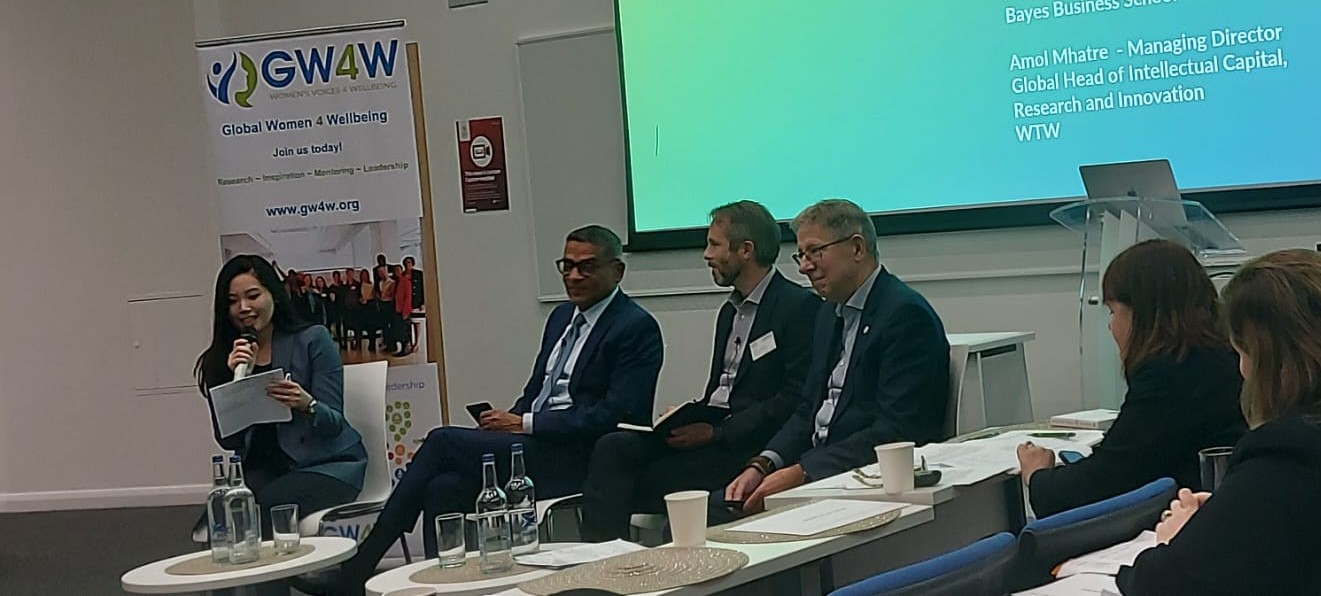Positive disruption: How can it ensure gender equity at home and in the workplace?
Embedding techniques into workplace strategies and challenging cultural acceptances discussed at Global Women 4 Wellbeing event at Bayes Business School.
Being positively disruptive at home and in the workplace is an important step to ensuring gender equity, according to female leaders and strategists.
Global Women 4 Wellbeing met at City, University of London to discuss ways women can positively disrupt the status quo.
The non-profit organisation which promotes female leadership spoke along with academics from Bayes Business School and panellists from organisations including the event sponsor and HR consultancy WTW.
Professor Lilian de Menezes, Associate Dean for Diversity, Equity and Inclusion at Bayes, opened the session following the welcome from the organisers, Mim Senft, CEO of GW4W, and Amanda Scott, Global Mergers & Acquisitions Leader at WTW.
 Dr John Forth in discussion with Amol Mhatre and Robert Baker
Dr John Forth in discussion with Amol Mhatre and Robert Baker
Professor de Menezes said: “We have been striving to play an active part in building a safe, just, humanitarian, equitable, and sustainable future. However, there remains a long way ahead to achieve these objectives.
“Globally, a significant proportion of women do not have equal access to the labour market – some are still risking their lives for basic rights, and within the privileged minority of women – leaders, there is frustration with the pace of progress. So, how are we changing the world?
“How can we confront gender pay gaps, what do we need to be positively disruptive, and how we may close the gender-equity leadership gap? These are complex issues, but it is important to feel comfortable to join the discussion.”
The keynote speech came from Rachael McCann, Director at insight-led solutions firm WTW. Ms McCann’s role includes developing and evolving DEI solutions at organisations and helping to embed it into strategies, citing her areas of focus as care equity, wellbeing and financial resilience.
Ms McCann called on the audience to challenge cultural acceptances with the support of allies and mentors, saying “when you think of culture, do you think of a thing or a feeling? Do you feel safe to speak up, or ask for what you need, or to say, ‘I can’t be here because I need to be somewhere else to care for someone’? It doesn’t mean I am not committed to my job. Disruptive change comes from all of us each day thinking about what we can do and what can we give back.”
Dion Johnson, a Board-Level Leadership Strategist, encouraged the audience to think about three things: how do you answer the call to positively disrupt in your domain? How do you do this and maintain your health? What does healthy disruption look and feel like? Ms Johnson said: “being healthy and strong are key to being disruptive”, adding: “if you can’t be a disrupter in your professional space, be that person at home where you have more authority”.
Other speakers at the event included Dr John Forth, Senior Lecturer in Human Resources Management, who cited “listening and perspective” as important in understanding the true experience on a panel discussion with Amol Mhatre and Robert Baker on how men can be allies and bridgebuilders. There was also a panel discussion with Amanda Scott, Hira Ali and Dr Sabrina Robinson on moving gender equity forward.
The event concluded with a fireside chat with Mim Senft and Amanda Scott to explore the importance of DEI in leadership as well as a call to action to speak up, take action and join GW4W in the pursuit of positive disruption.
Ends
Notes to editors
- Since 2017, Bayes’ Global Women Leadership Programme has provided 34 scholarships for high-potential female students across different programmes.
- Of 11 academics in Bayes’ Senior Leadership Team, five are female.
